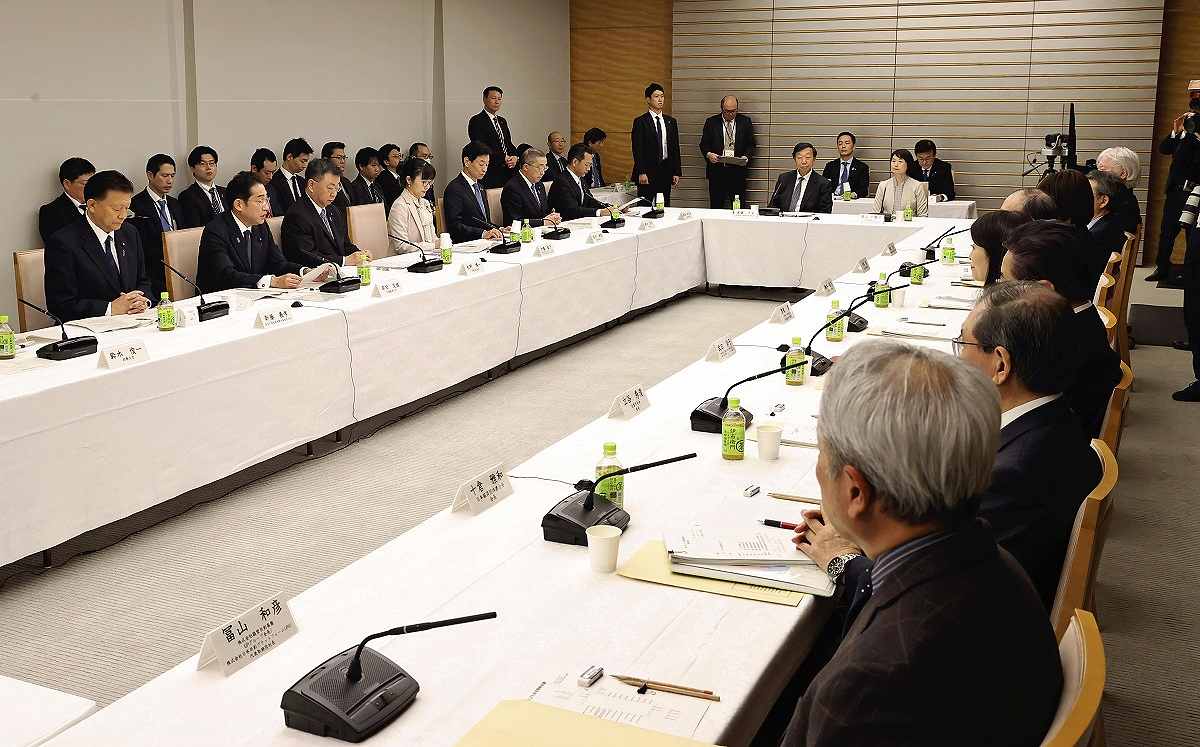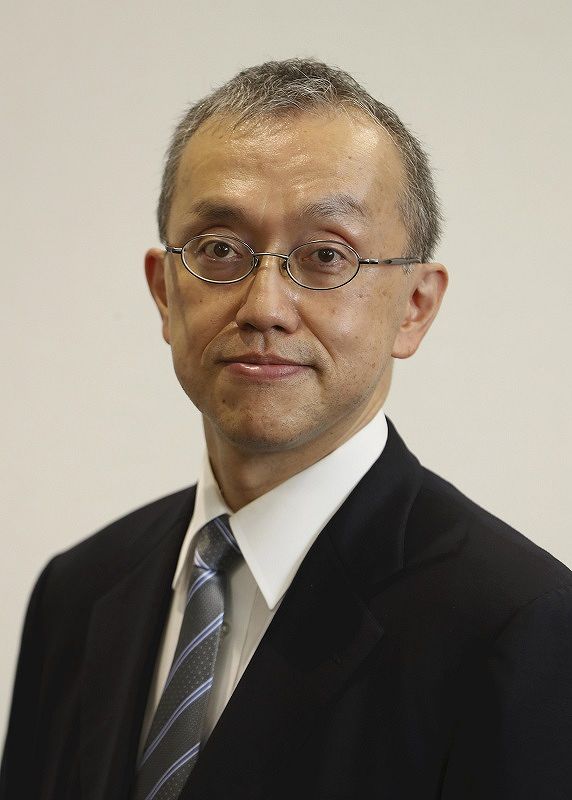Population Decline Reshaping Japanese Political Scene; Problem Recognized, But Agreement Lacking on Solutions

Prime Minister Fumio Kishida holds a meeting of the Children’s Future Strategy Council at the Prime Minister’s Office on Dec. 11, 2023.
8:00 JST, June 15, 2024
If you travel to a rural city or town in Japan, you will surely see many empty houses and find the downtown area filled with shuttered shops. You may be welcomed by elderly people, but you will rarely see children playing outdoors. It is a common situation in the countryside across Japan and a clear example of the decrease and aging of the population.
Since peaking in 2008, the Japanese population has been shrinking each year, and recently the pace of decline has accelerated. It has been dropping at a rate of 600,000 people per year. This means that the equivalent of a small prefecture disappears every year. Based on a survey by a government research institution, within 50 years, the total Japanese population, which is about 124 million now, will drop to 70% of its current level, and people aged 65 or older will account for nearly 40% of that.
This is an ongoing demographic crisis which has not only caused a labor shortage and constrained economic growth, but has drastically changed the political landscape of the country.
Because the low birth rate has lasted for decades, there has been a great numerical imbalance between age groups. The population of people in their 20s is about 12 million, which is equivalent to 70% of the people in their 50s and 80% of the people in their 70s. As the voting rate among young people is lower than that of the older generation, younger voices have less influence on policymaking.
In a Yomiuri Shimbun opinion poll last year, 70% of respondents thought that the falling birthrate was a severe problem for the future of Japan. Asked whether the whole of society should bear the financial burden of funding countermeasures to stop the decline of the birthrate, 68% answered “agree” or “somewhat agree.” But when the respondents were asked about specific ways to bear this burden, more than 70% opposed raising taxes, hiking social insurance premiums or reducing social security payments.
Prime Minister Fumio Kishida has boasted that his administration is tackling the problem of the declining birthrate with “different dimension” measures. The government asserts that it has sufficient policies and has allocated a sufficient budget for the younger generation. But so far, a lot of government money has been spent on short-term economic stimulus or overly generous welfare, which has led to an enormous and difficult debt obligation for future generations.
In recent times, young Japanese are apt to suffer a sense of stagnation and a feeling of pessimism for their future. Political apathy among young voters has caused low turnout in national elections, leading to an overemphasis on the political interests of older generations. This is becoming a vicious cycle that will be hard to break. Some pundits call this political situation “silver democracy.”
Another problem is the growing disparity in populations among prefectures. The constituencies of the House of Representatives have been changed repeatedly based on demographic change. Owing to the long-standing movement of people from rural areas to major cities, 140 constituencies of the lower house, nearly half of all single-seat constituencies, have been redrawn for the next general election.
The number of Diet seats in sparsely populated prefectures is decreasing while the number of seats in populous prefectures such as Tokyo and Kanagawa is increasing. It is the only way to redress the vote-value disparity, but it is disadvantageous to the long-dominant Liberal Democratic Party because rural areas are their strongholds and they have had many safe seats there.
In contrast, urban constituencies are extremely competitive and there are few safe seats. An LDP Diet member from Tokyo was heard lamenting that his constituency has a highly fluid population, with a third of all voters changing within a few years. It is hard for members from the metropolitan area to keep winning in elections held at intervals averaging every 2½ years. So, if urban seats in the lower house increase as seats in rural constituencies decrease, the ranks of veteran and experienced lawmakers will diminish. Without them no administration, whether it be controlled by the LDP or another party, can perform its function adequately.
Moreover, demographic changes have led to a drastic decrease in the number of local assembly members over the last 20 years. A quarter of a century ago, the government began to promote consolidation of cities, towns and villages to strengthen their financial bases. Over the same period, municipalities have reduced their assembly seats following public outcry demanding a reduction of the seats. The total number of local assembly seats has been halved to 32,000. Most local assembly members are officially independent but have played a significant role in national election campaigns, especially for the LDP. This may be one reason why the LDP has become vulnerable to election headwinds.
Those who know the Japanese population is decreasing wonder why Japan has refused to accept large-scale immigration. U.S. President Joe Biden even described Japan as being “xenophobic,” but the Japanese government rebuffed his remarks.
In the U.S. and some European countries, immigration issues have split public opinion and fueled narrow-minded nationalism. In Japan, the government officially denies adopting any kind of immigration policy and hesitates to accept many refugees, and it has had to loosen restrictions on the entry of foreign labor very cautiously to avoid unnecessarily worrying or provoking the public.
Nowadays we see many workers from other Asian countries everywhere such as in restaurants, izakaya pubs and convenience stores. There are about 2 million foreign nationals working in Japan, and this number will surely increase. If Japan is to stay prosperous and stable, we need foreign nationals to work and live with us, and we have no alternative other than to make an inclusive society. For Japanese politics this is a distant goal and a challenging task, but it may be one of the right ways to cope with chronic and historic depopulation and aging.
Political Pulse appears every Saturday.

Takayuki Tanaka
Takayuki Tanaka is the president of The Yomiuri Shimbun, Osaka. His previous posts included managing editor of The Yomiuri Shimbun, Tokyo.
Top Articles in Editorial & Columns
-

Riku-Ryu Pair Wins Gold Medal: Their Strong Bond Leads to Major Comeback Victory
-

China Provoked Takaichi into Risky Move of Dissolving House of Representatives, But It’s a Gamble She Just Might Win
-

University of Tokyo Professor Arrested: Serious Lack of Ethical Sense, Failure of Institutional Governance
-

Policy Measures on Foreign Nationals: How Should Stricter Regulations and Coexistence Be Balanced?
-

Japan’s Plan for Investment in U.S.: Aim for Mutual Development by Ensuring Profitability
JN ACCESS RANKING
-

Japan PM Takaichi’s Cabinet Resigns en Masse
-

Japan Institute to Use Domestic Commercial Optical Lattice Clock to Set Japan Standard Time
-

Israeli Ambassador to Japan Speaks about Japan’s Role in the Reconstruction of Gaza
-

Man Infected with Measles Reportedly Dined at Restaurant in Tokyo Station
-

Videos Plagiarized, Reposted with False Subtitles Claiming ‘Ryukyu Belongs to China’; Anti-China False Information Also Posted in Japan























